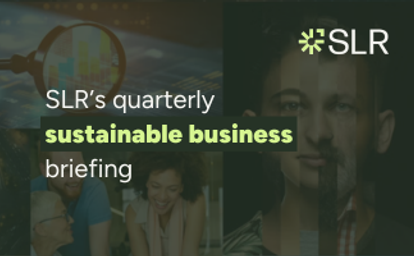
Building Near Rail Lines in Canada: How to Manage Noise, Vibration, and Approvals
by Ben Adler
View post

In a rapidly shifting global landscape, businesses are under growing pressure to respond to society’s most urgent needs. Whether navigating post-pandemic inequality, climate-driven crises, or the rising scrutiny on ESG commitments, companies face a critical question: how can they generate tangible social impact while maintaining operational resilience and a competitive edge?
One of the most powerful, and often overlooked, levers at their disposal is: procurement.
At Business for Societal Impact (B4SI), we provide the global standard for measuring, managing, and maximising corporate Social Impact as a business strategy. Globally recognised, and supported by SLR, B4SI is a practitioner-led network of over 170 major companies worldwide, equipping businesses with a clear, decision-useful framework that translates social investments in community, procurement & innovation into actionable, comparable data.
Co-created with business, the framework enables companies to generate credible internal insights for business cases and investment decisions - while also producing robust, cut-through data that can be mapped to external ESG and disclosure frameworks. The result: social impact becomes both a driver of business value and a source of transparent accountability.
And as we use common measurement language, we have 30 years of benchmarking insights accessible to all our network. Earlier this year, we had the opportunity to contribute to the World Economic Forum’s State of Social Procurement 2025 report, launched at Davos in January. Our chapter ‘Beyond Compliance: Measuring Social Impact in Procurement’ explored why social procurement is no longer a “nice to have”, but a strategic imperative [1].
We often hear a mix of definitions floating around, so let me put it simply. Social procurement is about using your company’s buying power to generate positive social outcomes. It’s not just about what you buy, but who you buy from and how that spend shapes communities, economies, and futures.
Think sourcing from social enterprises, working with Indigenous- or minority-owned businesses. It’s the shift from “do no harm” to “actively do good.”
Let’s be clear - this is not about replacing vital work on human rights and labour conditions in supply chains. That’s the baseline. Social procurement goes a step further: it’s about proactive investment in equity, inclusion, and opportunity.
We’re at a tipping point in 2025. Here’s why:
“Social risks now account for one in five supply chain disruptions. That makes procurement not just a functional necessity, but a strategic lever for inclusive growth and risk mitigation.”
- Katerina Hoskova, Lead for Social Innovation (Private Sector) at WEF
This was front and centre at our recent webinar series Procure for Impact - Measuring What Really Matters, which featured speakers from SAP, Stockland, Social Traders, and the World Economic Forum.
Rebecca Green, Head of Transformation at Social Traders, summed it up well:
“When you buy from social enterprises, you're not just buying goods and services - you’re buying impact that helps people live full, healthy lives.”
Many of the globally operating companies I speak with feel daunted by the idea of “overhauling” procurement. But the truth is, it’s not about revolution. It’s about integration.
Jennifer Beason, SAP’s Global Director of Impact Entrepreneurship, captured the essence of this movement with a simple truth:
“Sometimes it starts with a cup of coffee.”
A small contract with a social supplier can spark long-term, systemic change.
Here’s where to start:
SLR, for example, now stocks toiletries from Hey Girls (tackling period poverty) and sources holiday hampers from The Social Supermarket (featuring mission-driven brands). It’s about weaving social impact into the everyday. The magic happens when social procurement becomes business-as-usual - embedded in the processes, language, and incentives of the procurement function.
BDO buys from Nemi Teas, which employs refugees and produces sustainable, plastic-free products. They’ve even fast-tracked payment terms and lightened due diligence to remove barriers for social enterprises.
And at Stockland, social procurement is embedded at every level: from asset planning to construction and operations. As Justine Felton, Group Social Sustainability Manager at Stockland put it:
“Every asset builds social impact into its business plan.”
These aren’t one-off projects; they’re strategic investments that generate reputational, operational, and social returns.
This approach not only supports underrepresented communities but also helps to close talent gaps and future-proof supply chains.
In addition, companies can bring their community & social investments into play to support the development of social enterprises.
“Investing in ecosystem building is a winning strategy.” Jennifer Beason, SAP
Intent is great, but impact is what counts. And you can’t manage what you can’t measure.
At B4SI, our framework helps companies do exactly that, from tracking inputs and outputs to evaluating long-term social outcomes. It’s about bringing the same clarity to social investments that we expect in any other business decision.
And it’s working. Over the past 10 years, we’ve seen a 37% increase in impact reporting with a clear shift in emphasis from simply counting individual beneficiaries towards tracking how organisations and systems are being strengthened over time. Social data is also being pulled into mainstream ESG dashboards and risk assessments, making it integral to business performance rather than a side narrative.
For procurement teams, this means a new level of visibility and credibility. It enables consistent metrics across categories and regions, robust reporting for boards on supplier inclusion and community outcomes, and – critically - a data-driven story that speaks to investors, customers, and regulators alike.
Want to explore it? Visit us at www.b4si.net
We’re entering a new chapter of social disclosure and I’m proud to be part of that work through the Taskforce on Inequality and Social-related Financial Disclosures (TISFD) [2].
This initiative, still in technical development, is shaping the global framework for how companies report on inequality and social impact. Pulling together work already carried out by EFRAG, ISSB, and others to ensure interoperability and clarity in the measurement and understanding of ‘S’ and the already existing TCFD & TNFD Frameworks.
Social procurement is no longer a fringe idea. It’s a practical, scalable strategy for delivering impact in a world that demands it.
To recap:
In an era where ESG expectations are rising fast, companies that invest in social procurement today will build the resilience, trust, and talent advantage they need for tomorrow.
Enjoyed this article? For more like it, get SLR's quarterly sustainable business briefing straight to your inbox.
Sign Up
---------------------------------------
References:
[1] https://initiatives.weforum.org/global-alliance-for-social-entrepreneurship/socproc-measurement